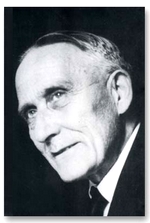Louis Massignon
| Louis Massignon | |
|---|---|
 |
|
| Born |
25 July 1883 Nogent-sur-Marne |
| Died | 31 October 1962 (aged 79) |
| Language | French |
| Nationality | French |
| Education | Lycée Louis-le-Grand |
| Alma mater | Collège de France |
| Notable works |
Annuaire du Monde Musulman La passion de Hussayn Ibn Mansûr an-Hallâj |
| Spouse | Marcelle Dansaert-Testelin |
Louis Massignon (25 July 1883 – 31 October 1962) was a Catholic scholar of Islam and a pioneer of Catholic- Muslim mutual understanding. He was an influential figure in the twentieth century with regard to the Catholic church's relationship with Islam. He focused increasingly on the work of Mahatma Gandhi, whom he considered a saint. He was also influential, among Catholics, for Islam being accepted as an Abrahamic Faith. Some scholars maintain that his research, esteem for Islam and Muslims, and cultivation of key students in Islamic studies largely prepared the way for the positive vision of Islam articulated in the Lumen gentium and the Nostra aetate at the Second Vatican Council. Although a Catholic himself, he tried to understand Islam from within and thus had a great influence on the way Islam was seen in the West; among other things, he paved the way for a greater openness inside the Catholic Church towards Islam as it was documented in the pastoral Vatican II declaration Nostra aetate.
Louis Massignon was born in Nogent-sur-Marne near Paris, France. His father, Fernand Massignon (1855–1922), a painter and a sculptor under the pseudonym Pierre Roche, was an intimate friend of novelist Joris-Karl Huysmans. Huysmans' own conversion to Roman Catholicism was one of the first major inspirations of the young Louis in a friendly tutorial relationship that lasted from 1901 till Huysmans' death in 1907.
Louis Massignon started his studies at the Lycée Louis-le-Grand in Paris (1896) where he befriended his classmate Henri Maspero, later a renowned sinologist. Following his "baccalauréat" (1901) he went on a first trip to Algeria where his family had relations, and ties with high colonial officers: Henry de Vialar, Henry de Castries, and Alfred Le Chatelier, the founder of the Chair of Muslim Sociology at the Collège de France in Paris. In 1902, he continued his studies, graduating "licencié ès-lettres" on an essay on Honoré d'Urfé and embarking on the first of his many Arab subjects: the corporations of Fez in the 15th century. Exploring the sources of his study in Morocco in 1904 he vowed to dedicate himself to the study of Arabic after a dangerous confrontation in the desert. In 1906, he received his "diplome d'études supèrieures" on the strength of his study Tableau géographique du Maroc dans les 15 prémieres années du 16ième siecle, d'après Leon l'Africain.
...
Wikipedia
